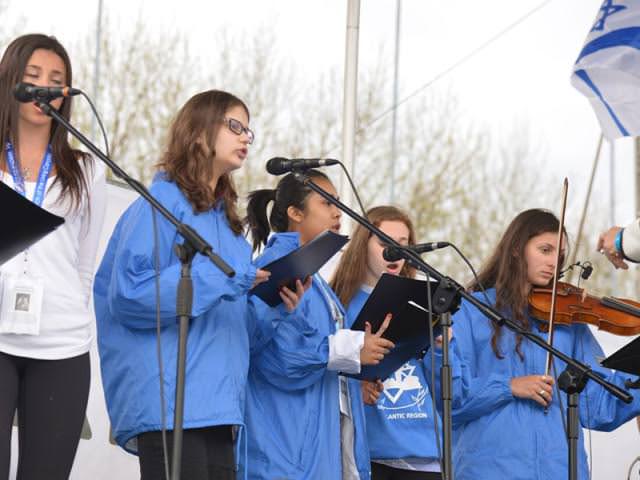 On Nov. 11, Canadians will gather at cenotaphs, schools, churches, synagogues and other public places to mark the sacrifices of Canadian soldiers in armed conflicts around the world.
On Nov. 11, Canadians will gather at cenotaphs, schools, churches, synagogues and other public places to mark the sacrifices of Canadian soldiers in armed conflicts around the world.
To make the 70th anniversary of the end of World War II even more significant, March of the Living Canada (MOL) is asking schools taking part in Remembrance Day activities to add the video of a unique peace song to their memorials – Lay Down Your Arms.
Written by a wounded Israeli veteran of the Yom Kippur War to honour his fallen comrades, with lyrics by a Canadian songwriter and a bridge by a local musician, the song “has Canadian content and a universal message,” said MOL national director Eli Rubenstein.
It is a message that would be appreciated by Canadian soldiers who made the ultimate sacrifice – that their efforts should lead to a world at peace, he said.
In the original Hebrew version, songwriter Doron Levinson incorporated text from the book of Isaiah, including the famous lines: “They shall beat their swords into ploughshares and their spears into pruning hooks. Nation shall no longer raise up arms against nation, neither shall they teach their children war anymore.”
Working with Levinson’s melody, lyricist Lisa Catherine Cohen updated and modernized the words rather than simply translate the Isaiah text. Harry Lewis wrote the bridge, said Rubenstein.
First recorded in Toronto more than 20 years ago by the Habonim Youth Choir, it was only recently made into a music video with new arrangements by Habonim Cantor Aviva Rajsky and guitarist Tom Bellman.
The recent version featured the March of the Living Children’s Choir as well as the Habonim Youth Choir. It was performed on Holocaust Remembrance Day during a MOL ceremony at Auschwitz-Birkenau before 10,000 people. It was also performed at the Tempel Synagogue in Krakow and in Israel at the Mini-Israel park near Latrun, between Yom Hazikaron, which honours Israel’s war dead, and Yom Ha’atzmaut, Israel’s Independence Day.
The music video included excerpts from those performances as well a rehearsal in Toronto.
Adding a unique element to the video, the Israel Museum gave permission to include images from the Dead Sea Scrolls, specifically the Great Isaiah Scroll, the oldest known version of the biblical book.
“In the video you see lines written 2,200 to 2,300 years ago, on cracked parchment,” Rubenstein said. “It’s interesting to think that in 2015, with all sorts of modern technology, we’re reading something written in the hills of Judea 2,500 years ago. Look how powerful that message is.
“They remind us how far we have to go to build a world of peace.”
In Cohen’s updated English-language lyrics, the song ends with the stanza: “Somewhere deep inside the soldier, there’s a dreamer/ Dreaming of a world of peace/ Lay down your arms/ Let time heal every wound/ And love will someday set us free.”
The last line of the song is meant as a counterpoint to the cynical message the Nazis incorporated on an iron gate at Auschwitz, that work will set you free. And the line, “Every hand that holds a sword can hold a baby,” is particularly relevant during the current “knife intifada,” Rubenstein said.
MOL staff sent copies of the video and sheet music to schools, with the suggestion they play video of the song during Remembrance Day commemorations and learn the song for future memorial events.
“In a world still scarred by war and violence, with the threat of further turmoil looming on the horizon, the message of Lay Down Your Arms is as timeless and as needed as ever,” Rubenstein stated.
Original article published HERE.








